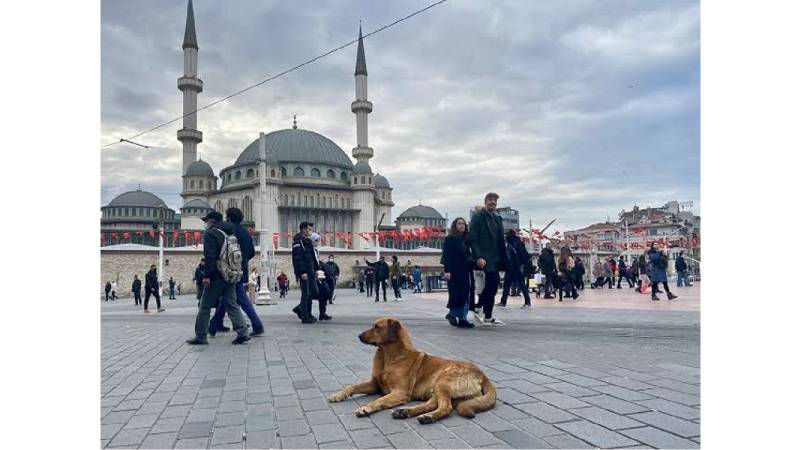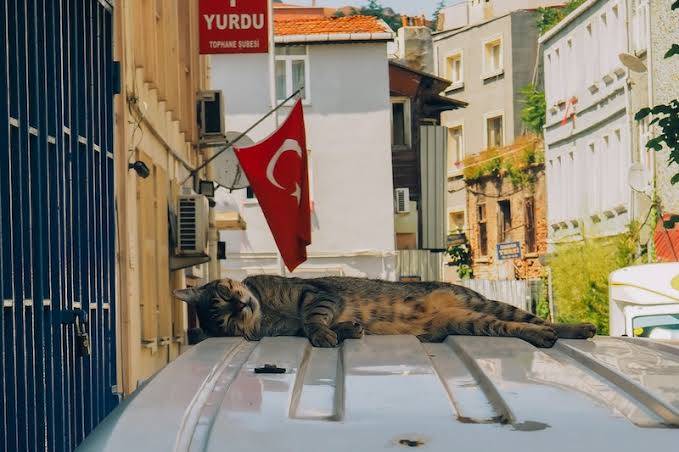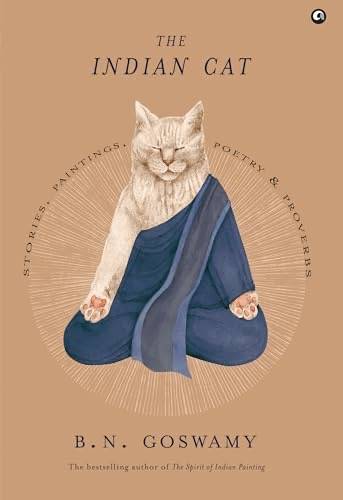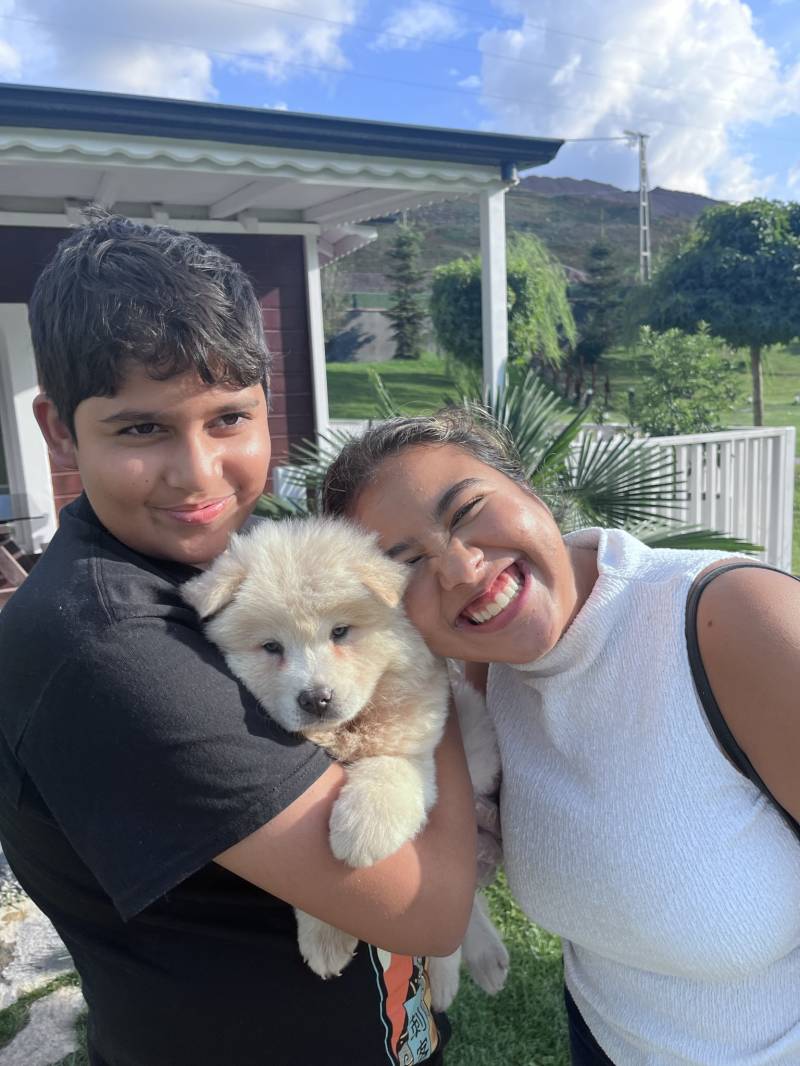
The way a society treats its animals is reflective of its humanity. If that is the case, then Turkey is not only a safe haven for animals but a beacon of compassion and humanity. Istanbul as a city is as much for animals as it is for humans. Stray dogs and cats wander nonchalantly in its busy streets. They sit in the middle of the roads and pavements, expecting cars and pedestrians to move away. I found this puzzling at first. I noticed cats wandering in and out of restaurants, shops and even public transport. They usually find welcoming bowls of milk and water wherever they go.
Though Turkish human politics themselves can be quite contentious, as can be seen during the elections earlier this year, law makers are unanimous about action against any wanton massacre, extinction, torture and maltreatment of animals, as well as their economic exploitation and the destruction of their habitats. Animals are seen as living creatures rather than as casual commodities.
Turkish law actually protects stray animals, with a program designed to protect and oversee the vast number of stray animals that roam the country, estimated to be at least half a million. One sees food and water stations as well as safe refuges at almost every block. The state ensures that animals receive tagging, vaccines, spray and neuter services. Vets and animal stores are found in every neighbourhood. Residents are encouraged to feed or adopt pets, regardless of whether they live in an apartment or in a house.

My family had been prevaricating for years about getting a pet. Moving to Turkey has finally been a game changer for us. We had no choice; one cannot live in Istanbul without a pet. Animals are integral to the Turkish way of life. Inspired by this, we got an adorable fluffy puppy from a beautiful dog farm set in the Anatolian side of the city. The farm looked like some five star hotel with a pool, walking facilities for canines and facilities for the comfort of its residents.
Cats and dogs have been immortalised in various documentaries set in Istanbul. The movie Kedi (2021) focused on the experiences of cats in Istanbul. It received critical acclaim within Turkey and in the US. The cinematography was configured at street level. The camera sees the world through cats’ eyes as it pads noiselessly, inquisitively, through the back alleys of Istanbul. There is a civic logic in having cats in such urban congestion. They serve a useful purpose: they eat leftover food; they chase away rats and other vermin; and they humanise the population. It is not surprising thatat a modern metropolis like Istanbul with 18 million people should have as many hearts and so much soul.

Heart and soul are also central to the two other animal movies that have received critical acclaim over the past few years. The Oscar winning short film documentary about two elephant whisperers in Tamil Nadu is now available on Netflix and is well worth a watch, especially if you are in need of a therapeutic cry.
Elephants, like children, crave physical affection and love. A couple - Bomman and Belie - care for two injured baby elephants in the stunning Mudumalai tiger reserve in Tamil Nadu. The story is set against the backdrop of the Nigili mountains, which resemble the forests in Kipling’s Jungle Book. At any moment, one expects Mowgli to jump onto the back of an elephant as it is being bathed in the river.
The couple belong to the Kattunayakan community who have preserved the forest for generations. In a particularly moving ceremony, it is clear that the elephants, symbolising the elephant-headed Lord Ganesha, are as much a part of the community at special events as the humans are.
Deforestation and climate change over the years have forced elephants to encroach upon the areas used by humans. During these migrations, the young often get separated from their herd. The story is touching as it shows how the old lady, suffering the loss of her own adult daughter, channels all her parental affection towards resuscitating Raghu, an injured baby elephant over a three year period. They are foster parents and true care givers, dedicating their lives towards bathing, feeding and cleaning the two elephants in their care. The daily routine consists of feeding millet, jaggery and desiccated coconut. It is interesting to think that the Asian elephant diet must be so different from their African brethren.
India counts as one of the most highly rated countries in terms of animal welfare laws. The list includes Tanzania and Kenya, Austria and Switzerland. I was surprised that Turkey does not feature as high up on this list when Turkish citizens regard street animals as communally-owned pets, rather than traditional strays. The country has a blanket no-kill, no capture policy.
I was told of a story of an unfortunate foreigner who had opened a boutique restaurant in Istanbul. When she was seen shooing away some stray cats and dogs, the video footage went viral and forced her to close the business. Though these anecdotes are not quantifiable, it reflects on the local environment and how hospitable it is for animals. Having a dog as a family member in Istanbul, we have been well briefed on its rights. He has to be tagged with a microchip for tracking purposes. If we mistreat our little newcomer, we can get a two-year prison term for maltreatment. We face penalties of up to TL 10,000 (US$370), if we abandon him. We have been made aware that his rights are as protected as our own.

Looking after him is a novel experience. The pet stores are full of gourmet lamb and rice dishes. In our home, our housekeeper sets aside the choicest bones for him. He has fast become the most popular and loved member of our nuclear family, in part because he is always happy to see us and never talks back or criticises. What more can one ask for in a family member?
A recently published book by the Indian art-historian Dr. B.N. Goswamy pays an overdue homage to The Indian Cat: Stories, Paintings, Poetry, and Proverbs. He traces the presence of cats in Indian miniature painting, in legends and in literature. Only he would have found this poem by Allama M. Iqbal, the Poet of the East. Titled On seeing my cat in someone else’s lap, Muhammad Iqbal asks:
Ah! Perhaps you have the same questions that I have:
Is man alone sensitive to beauty, to love?
Or does it reside in all hearts, of all creatures?
Istanbul has reminded us as a family that it does. It is comforting to live in a society where each member of our family has equal space and value – regardless of size, voice or habits.

